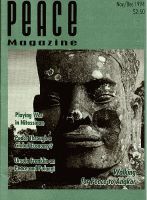
Peace Magazine Nov-Dec 1994, page 29. Some rights reserved.
Search for other articles by Graeme MacQueen here
Nonviolent action in Central America & the Middle East
One of the most refreshing and inspiring peace events in Canada in recent years was the June 1989 conference on nonviolence in violent contexts, organized by the McMaster University Centre for Peace Studies. It is equally exciting that many of the most memorable speeches from this historic gathering are now available in an engaging book.
The McMaster University Conference was well-timed for peace activists seeking to understand more about the power of nonviolent protest in difficult situations. It came shortly after that awesome, yet failed, expression of nonviolent struggle against dictatorship: the student protests in Tiananmen Square. But, the audience had a chance to hear Gene Sharp, the world's foremost theorist of nonviolence. Afterward, they would be prepared to understand how the Communist dictatorships of Eastern Europe would come tumbling down. Nor would that audience be surprised by the recent dramatic breakthroughs in the Middle East peace process and the peace accord in El Salvador.
Sharp's lecture is as powerful now as when it was delivered five years ago, since it addresses some of the most difficult questions regarding nonviolence. He is refreshingly firm in his advocacy of nonviolence. Take for instance this passage, "When Martin Luther King was killed they said, 'King is dead, nonviolence is dead.' When Che Guevara was killed in Bolivia none of those same people said, 'Guerrilla warfare is dead.'"
Sharp recalls a conversation with the foremost theorist of armed struggle, Frantz Fanon. He notes that Fanon abandoned nonviolent struggle after the initial strikes and boycotts suffered a few casualties, yet he accepted heavier losses from strategies of guerrilla warfare. This led to the death of one million of Algeria's total population of nine million.
Sharp's description of the reasons for the failure of the Chinese student protests are insightful. His advice seems to have been taken up at critical times in the subsequent collapse of the Communist world; his strategy was read during the popular resistance to the failed coup against Mikhail Gorbachev. Sharp shows that nonviolence must have a serious strategy, similar to that employed by generals, but without violence. His lecture noted that the brave students of Tiananmen had so little knowledge of unarmed tactics that they "didn't even knowthat if you go on a fast you need to take water."
Mubarak Awad's now successful advocacy of nonviolent struggle in Israel makes fascinating reading in historical retrospect. His remarks show that the criticisms once levied at him by supporters of armed struggle are now quite ridiculous in hindsight. When he first started talking about nonviolence Awad was called "a CIA agent... an Israeli agent... I became all kinds of things to all kinds of people."
It is urgent that this book be read because it will give peace activists the documentation they need to point out the power of nonviolence in difficult situations. In the crisis of the former Yugoslavia, in Haiti, in the Gulf crisis, peace activists have continually been challenged to point out solutions that can end brutal military dictatorships without the application of armed force. This book will help provide some inspiring replies.
Reviewed by John Bacher, a Toronto-based writer on peace and the environment.

Peace Magazine Nov-Dec 1994, page 29. Some rights reserved.
Search for other articles by Graeme MacQueen here